Coca-Cola has been named the “wellness” sponsor for BlogHer 2026, an annual conference that celebrates the best in health, family, entertainment, sex, DIY, and political blogging by and for women. Coca-Cola will be hosting their Steps to Wellness challenge and campaign at this weekend’s conference, but not without a bit of backlash first. Even though Coke will be handing out pedometers to all BlogHer attendees (speaking of pedometers, it takes 40 minutes of walking to burn off the calories in a can of Coke), their presence under auspices of being a health brand is rubbing the wellness community the wrong way.
Leah Segedie, a health blogger and founder of Mamavation, is calling out BlogHer, which did not return our request for comment, for choosing the soft drink brand as the wellness sponsor. Tonight, she is hosting a Twitter party to spread the word.
“I don’t know why they chose to accept Coke as a sponsor, but this marketing ploy is consistent with what they’ve been doing all year with other conferences, commercials, and outlets,” said Leah. She cited Coke’s falling market share and lawsuits (this week it’s VitaminWater for deceptive labeling) as the main motivation to “make people feel better about drinking their product again.”
A 12-ounce serving of Coca-Cola is a 140 calorie and 39.9 gram blast of high fructose corn syrup. Coca-Cola is not a healthy beverage, and meanwhile more than one-third of Americans are obese because they drink too much of the stuff. Additionally, the soda contains artificial dyes, GMOs, and has traces of BPA from the aluminum can, a known obesogen. High fructose corn syrup can lead to diabetes and diet soda has been proven to increase your waist size, not to mention a bevy of other health-related side effects from drinking the caramel colored syrup.
“It’s not very surprising to see Coca-Cola craft this physical activity campaign,” said registered dietitian Andy Bellatti. “The food industry uses physical activity as a shield; it allows them to position themselves as health-conscious and ‘part of the solution’ while completely avoiding the unhealthfulness of their products. I think one of the best and most important steps to wellness is to cut soda out of your diet.”
Leah would agree, citing the removal of soda as the first step in the more than 100 pounds she lost.
Leah claims that the health and wellness industry wouldn’t have cried foul if Coca-Cola, who also did not return our request for comment, was merely a general sponsor.
“This is marketing. This isn’t wellness. BlogHer should know the difference,” she said.
Her Twitter party is expected to attract between 300-500 people and will be using the hashtag #stepstowellness to discuss Coke’s controversial sponsorship. Earlier this year, Coke landed in hot water when a judge found the labeling on their Vitaminwater to be misleading. A Coke commercial in the UK was banned after it led viewers to believe all the calories in a can of Coke could be burned by laughing for 75 seconds. And then there’s that shocking and frightening video at the top of this article which shows Coke eating through rust on a car bumper until it’s buffed back to a perfect shine. Yikes.
This will be the ninth annual BlogHer conference and it is always an inspired way for bloggers to network, learn, and grow as a community. The Coke sponsorship is a great marketing and social media lesson for conference attendees to discuss and analyze, because this flap could seriously hurt BlogHer’s image, not to mention that of the bloggers who partake in Coke’s campaign.
Also Read:
Coca-Cola CEO Reacts to Mayor Bloomberg’s Soda Ban
Vitaminwater Claims Ruled Inaccurate in the UK
Some of America’s Top Brands are Leading Culprits in the Obesity Epidemic

